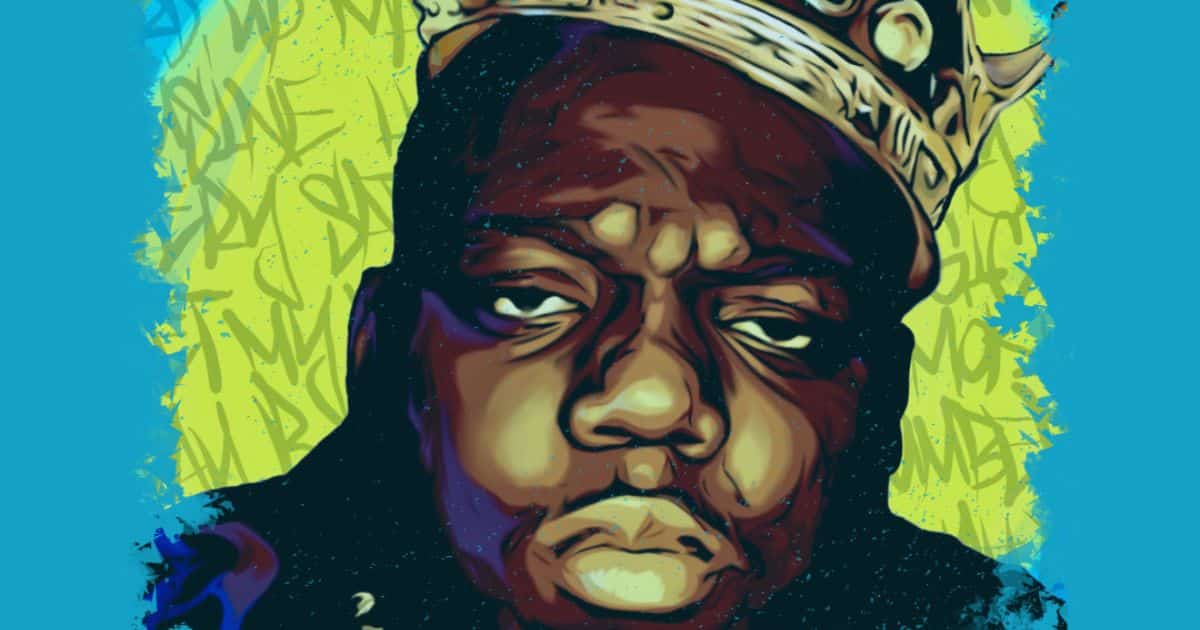In the world of rap music, few artists have left as indelible a mark as the legendary Biggie Smalls. Known for his impeccable flow, raw lyrical talent, and captivating storytelling, Biggie, also known as The Notorious B.I.G., revolutionized the genre and forever changed the landscape of rap music. Born and raised in Brooklyn, New York, Biggie emerged from the streets with a unique style that resonated with fans worldwide. His ability to effortlessly switch between gritty street narratives and introspective reflections made him an artist of unparalleled depth and versatility. With his debut album “Ready to Die” in 1994, Biggie captured the attention of both the East and West Coast rap scenes, solidifying his place as one of the greatest rappers of all time. Even after his untimely death in 1997, Biggie’s influence continues to be felt, as his innovative approach to storytelling and his larger-than-life persona continue to inspire a new generation of artists. Join us as we delve into the impact of Biggie Smalls on the evolution of rap music, exploring how his legacy continues to shape the genre we know and love today.
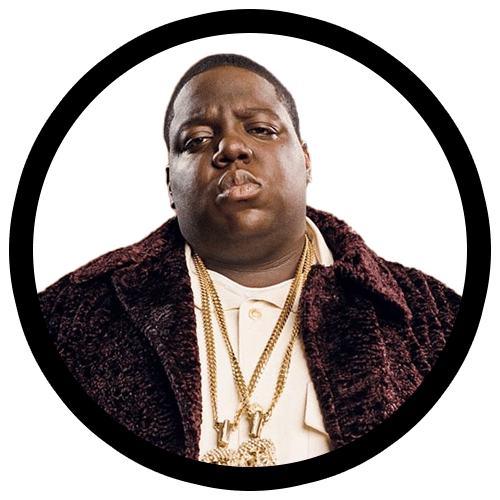
Biggie Smalls Clothing & Merchandise
Give your wardrobe a taste of ’90s hip-hop with the most extensive collection of Notorious B.I.G.’s clothing and merchandise online! From vintage t-shirts to stylish hoodies and comfy sweatshirts, you will have no shortage when it comes to showing love for Biggie Smalls – East Coast’s greatest rapper! And if that wasn’t enough, check out exclusive bomber jackets featuring The King himself. Get these unique items now before they’re gone forever… show off your swag with some iconic rap apparel today!
The rise of Biggie Smalls in the rap industry
Biggie Smalls, born Christopher Wallace, began his journey in the rap industry from humble beginnings. Growing up in the rough neighborhoods of Brooklyn, he experienced the harsh realities of street life, which became the backdrop for his music. Biggie’s talent and unique storytelling ability quickly caught the attention of influential figures in the industry, including Sean Combs, also known as Puff Daddy or Diddy. Through Combs’ record label, Bad Boy Records, Biggie released his debut single, “Juicy,” in 1994. The track became an instant hit, showcasing Biggie’s lyrical prowess and setting the stage for his meteoric rise to fame.
As Biggie’s popularity grew, so did his influence on the rap industry. His distinctive voice, smooth flow, and masterful delivery set him apart from his peers. Biggie’s ability to paint vivid pictures with his words allowed listeners to immerse themselves in his narratives, whether he was detailing the struggles of street life or reflecting on his personal experiences. His authenticity resonated with fans across the globe, and his impact on the rap industry was undeniable.
Biggie Smalls’ unique style and lyrical genius
One of the defining characteristics of Biggie Smalls’ music was his unique style and lyrical genius. His ability to seamlessly switch between different flows and cadences showcased his versatility as an artist. Whether he was rapping over gritty, boom-bap beats or smoother, melodic instrumentals, Biggie’s delivery was always on point. His flow was effortless, and his rhymes were meticulously crafted, demonstrating his mastery of the art form.
Biggie’s lyrical content was equally impressive. He possessed a remarkable ability to tell compelling stories through his music. From his vivid descriptions of street life to his introspective reflections on fame and success, Biggie’s lyrics were a window into his world. He tackled complex themes such as poverty, violence, and the pursuit of the American dream with a raw and honest perspective. Biggie’s authenticity and ability to connect with his audience through his lyrics set him apart from his contemporaries.
The influence of Biggie Smalls on rap music and culture
Biggie Smalls’ impact on rap music and culture cannot be overstated. He played a pivotal role in shaping the genre and pushing it forward. Biggie’s ability to fuse elements of East Coast and West Coast rap styles contributed to the diversification of rap music as a whole. His music appealed to fans on both coasts, bridging the gap between the two regions and fostering a sense of unity within the rap community.
Furthermore, Biggie’s influence extended beyond his music. His larger-than-life persona and charismatic stage presence made him an icon in the rap world. He became a symbol of success and resilience, inspiring countless aspiring artists to pursue their dreams. Biggie’s impact on fashion and style was also significant, as his signature looks, including his iconic crown and Versace ensembles, became synonymous with his image.
Biggie Smalls’ impact on storytelling in rap
One of Biggie Smalls’ most enduring contributions to rap music was his impact on storytelling. His ability to craft intricate narratives and vividly depict scenes through his lyrics set a new standard for storytelling in the genre. Songs like “Gimme the Loot” and “Warning” showcased Biggie’s storytelling prowess as he painted vivid pictures of the dangers and struggles of street life. His attention to detail and ability to create multi-dimensional characters within his songs added depth and complexity to his storytelling.
Biggie’s storytelling ability not only captivated listeners but also inspired a new generation of rappers to embrace narrative-driven lyrics. His influence can be seen in artists such as Kendrick Lamar, J. Cole, and Nas, who have all been praised for their storytelling abilities. Biggie Smalls’ legacy as a master storyteller continues to shape the rap landscape today.
Biggie Smalls’ contributions to the East Coast-West Coast rap rivalry
During the mid-1990s, the East Coast-West Coast rap rivalry dominated the rap industry. This intense rivalry pitted artists from the two coasts against each other, fueling a highly publicized and often contentious feud. Biggie Smalls found himself at the center of this rivalry, as he was seen as the representative of the East Coast.
While the rivalry ultimately ended in tragedy with the deaths of both Biggie Smalls and Tupac Shakur, Biggie’s contributions to the East Coast-West Coast feud cannot be overlooked. His music, particularly tracks like “Who Shot Ya?” and “Kick in the Door,” became emblematic of the East Coast’s response to the West Coast’s dominance. The rivalry brought rap music into the mainstream media, but it also highlighted the dangers and consequences that could arise from such intense competition.
The legacy of Biggie Smalls after his untimely death
Biggie Smalls’ untimely death on March 9, 1997, at the age of 24, shocked the rap world and left a void that is still felt today. Despite his short career, Biggie’s impact was far-reaching. His posthumous album “Life After Death” was released shortly after his death and became a critical and commercial success. The album showcased Biggie’s versatility and range as an artist, solidifying his status as one of rap’s greatest talents.
In the years following his death, Biggie’s legacy has only grown stronger. His influence can be heard in the music of countless artists who cite him as an inspiration. From his storytelling abilities to his unique flow, Biggie’s impact can be felt in the work of artists such as Jay-Z, Kanye West, and Drake. His status as a rap icon has only solidified with time, and his music continues to resonate with new generations of listeners.
The continued influence of Biggie Smalls on contemporary rap artists
Biggie Smalls’ influence on contemporary rap artists is undeniable. His impact can be heard in the music of artists across various subgenres of rap. His storytelling abilities and lyrical prowess continue to inspire new generations of artists to push the boundaries of the genre.
Contemporary artists such as Kendrick Lamar, J. Cole, and Tyler, the Creator have all cited Biggie as a major influence. They credit him with shaping their approach to storytelling and lyricism. Biggie’s influence can also be seen in the rise of trap music, as artists like Future and Migos incorporate his melodic sensibilities into their music.
Biggie Smalls’ cultural significance beyond music
Beyond his contributions to rap music, Biggie Smalls holds cultural significance that extends beyond the realm of music. He became a symbol of success and resilience for marginalized communities, particularly in Brooklyn. Biggie’s rise to fame from humble beginnings represented the possibility of overcoming adversity and achieving greatness.
Biggie’s impact on fashion and style also cannot be overlooked. His fashion choices, from his Versace outfits to his signature crown, influenced a generation of fans and artists. He brought a unique sense of style and swagger to the rap world, leaving an indelible mark on popular culture.
-
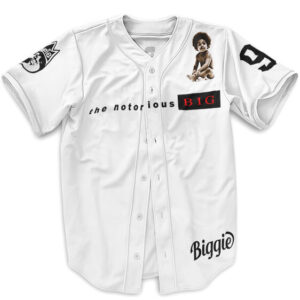 The Notorious BIG Ready To Die 1993 Baseball Jersey
The Notorious BIG Ready To Die 1993 Baseball Jersey -
 East Coast Rapper Biggie Smalls Tank Shirt
East Coast Rapper Biggie Smalls Tank Shirt -
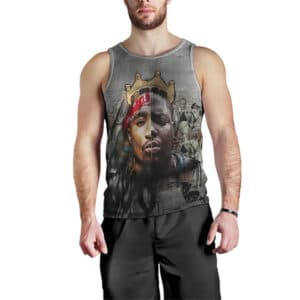 Iconic Rappers Tupac And Biggie Gray Tank Shirt
Iconic Rappers Tupac And Biggie Gray Tank Shirt -
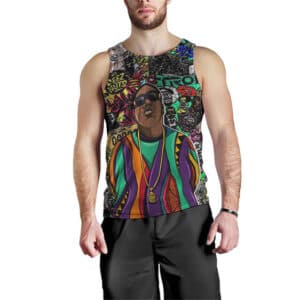 Biggie Caricature Hip Hop Background Tank Top
Biggie Caricature Hip Hop Background Tank Top -
 I Love When You Call Me Big Poppa Black Tank Top
I Love When You Call Me Big Poppa Black Tank Top -
 It Was All A Dream Biggie Art Tank Shirt
It Was All A Dream Biggie Art Tank Shirt -
 Biggie Smalls Necklace Design Tank Top
Biggie Smalls Necklace Design Tank Top -
 Biggie Smalls White Suit Globe Background Tank Top
Biggie Smalls White Suit Globe Background Tank Top -
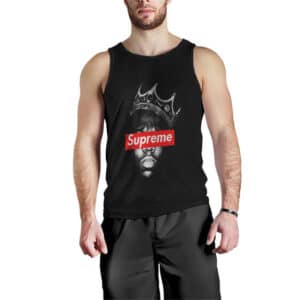 Crown Notorious B.I.G. Parody Logo Black Tank Top
Crown Notorious B.I.G. Parody Logo Black Tank Top
Conclusion: Biggie Smalls’ lasting impact on the evolution of rap music
In conclusion, the impact of Biggie Smalls on the evolution of rap music cannot be overstated. His unique style, lyrical genius, and storytelling abilities set him apart from his peers and forever changed the genre. Biggie’s influence on rap music and culture can still be felt today, as his legacy continues to inspire and shape the work of contemporary artists. From his contributions to the East Coast-West Coast rivalry to his impact on fashion and style, Biggie Smalls will always be remembered as one of rap’s greatest pioneers. His music and his larger-than-life persona have left an indelible mark on the genre we know and love today. As we celebrate the life and legacy of Biggie Smalls, we honor his profound impact on rap music and his enduring status as a rap icon.

